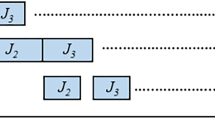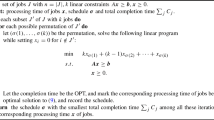Abstract
In this paper, we consider a simultaneous order acceptance and scheduling problem in a non-identical parallel machines environment. The orders are defined by their due dates, revenues, tardiness penalties, different processing times on the machines, and sequence-dependent setup times. We present an MILP formulation to maximize the profit. Furthermore, we assume that the revenue from an accepted order and the processing times are uncertain and accordingly, develop the robust counterpart of the proposed MILP model. The problem is computationally intractable; therefore, we develop a Benders decomposition approach to solve it. We introduce some valid cuts to accelerate the convergence of the classical Benders algorithm and a heuristic method to obtain the feasible solutions. Through numerical experiments on randomly generated large instances with up to 40 orders and 6 machines, we demonstrate that the proposed Benders decomposition approach outperforms the MILP model.
















Similar content being viewed by others
References
Azad N, Saharidis GKD, Davoudpour H, Malekly H, Yektamaram SA (2013) Strategies for protecting supply chain networks against facility and transportation disruptions: An improved Benders decomposition approach. Ann Oper Res 210:125–163
Ben-Tal A, El Ghaoui L, Nemirovski A (2009) Robust Optimization. Princeton University Press, Princeton and Oxford
Ben-Tal A, Nemirovski A (2000) Robust solutions of linear programming problems contaminated with uncertain data. Math Program 88:411–421
Benders JF (1962) Partitioning procedures for solving mixed integer variables programming problems. Numer Math 4:238–252
Bertsimas D, Sim M (2004) The price of robustness. Oper Res 52:35–53
Bertsimas D, Thiele A (2006) Robust and data-driven optimization: modern decision-making under uncertainty Tutorials in Operations Research 95–122
Cesaret B, Oğuz C, Salman FS (2012) A tabu search algorithm for order acceptance and scheduling. Comput Oper Res 39:1197–1205
Cote G, Laughton M (1984) Large-scale mixed integer programming: Benders type heuristics. Eur J Oper Res 16:327–333
El-Ghaoui L, Oustry F, Lebret H (1998) Robust solutions to uncertain semidefinite programs. SIAM J Optim 9:33–52
Gabrel V, Murat C, Thiele A (2014) Recent Advances in Robust Optimization: An Overview. Eur J Oper Res 235:471–483
Gabrel V, Murat CC, Remli N (2010) Linear programming with interval right hand sides. Int Trans Oper Res 17:397–407
Ghosh J (1997) Job selection in a heavily loaded shop. Comput Oper Res 24:141–145
Hopp WJ, Spearman ML (2000) Factory Physics, 2nd edn. McGraw-Hill, Columbus
Keskinocak P, Tayur S (2004) Due date management policies. Handbook of Quantitative Supply Chain Analysis: Modeling in the E-business Era, Kluwer
Lewis HF, Slotnick SA (2002) Multi-period job selection: planning work loads to maximize profit. Comput Oper Res 29:1081–1098
Liaw CF, Lin YK, Cheng CY, Chen M (2003) Scheduling unrelated parallel machines to minimize total weighted tardiness. Comput Oper Res 30:1777–1789
Magnanti TL, Wong RT (1981) Accelerating Benders decomposition: algorithmic enhancement and model selection criteria. Oper Res 29:464–484
McDaniel D, Devine M (1977) A modified Benders partitioning algorithm for mixed integer programming. Manag Sci 24:312–319
Mestry S, Damodaran P, Chen CS (2011) A branch-and-price solution approach for order acceptance and capacity planning in make-to-order operations. Eur J Oper Res 211:480–495
Nicholas JM (1997) Competitive Manufacturing Management: Continuous Improvement. McGraw-Hill, Columbus
Oguz C, Salman FS, Yalcin ZB (2010) order acceptance and scheduling decisions in make-to-order systems IntJ Production. Economics 125:200–211
Öncan T (2009) Alt\({\i }\)nel K, Laporte G. A comparative analysis of several asymmetric traveling salesman problem formulations. Comput Oper Res 36:637–654
Park J, Nguyen S, Zhang M, Johnston M (2013) Genetic Programming for Order Acceptance and Scheduling. Paper presented at the IEEE Congress on Evolutionary Computation, Cancún, México, June 20–23
Potts CN, Van Wassenhove LN (1985) A branch and bound algorithm for the total weighted tardiness problem. Oper Res 33:363–377
Rei W, Cordeau JF, Gendreau M, Soriano P (2008) Accelerating Benders decomposition by local branching. INFORMS J Comput 21:333–345
Rom WO, Slotnick SA (2009) Order acceptance using genetic algorithms. Comput Oper Res 36:1758–1767
Saharidis GKD, Boile M, Theofanis S (2011) Initialization of the Benders master problem using valid inequalities applied to fixed-charge network problems. Expert Syst Appl 38:6627–6636
Saharidis GKD, Ierapetritou MG (2010) Improving Benders decomposition using maximum feasible subsystem (MFS) cut generation strategy. Comput Chem Eng 34:1237–1245
Saharidis GKD, Ierapetritou MG (2013) Speed-up Benders decomposition using maximization density cut (MDC) generation. Ann Oper Res 210:101–123
Saharidis GKD, Minoux M, Ierapetritou MG (2010) Accelerating Benders method using covering cut bundle generation. Int Trans Oper Res 17:221–237
Saito H, Murota K (2007) Benders Decomposition Approach to Robust Mixed Integer Programming. Pac J Optim 3:99–112
Siddiqui S, Shapour A, Steven G (2011) A modified Benders decomposition method for efficient robust optimization under interval uncertainty. Struct Multidiscip 44:259–275
Slotnick SA (2011) Order acceptance and scheduling: a taxonomy and review. Eur J Oper Res 212:1–11
Slotnick SA, Morton TE (1996) Selecting jobs for a heavily loaded shop with lateness penalties. Comput Oper Res 23:131–140
Slotnick SA, Morton TE (2007) Order acceptance with weighted tardiness. Comput Oper Res 34:3029–3042
Soyster AL (1973) Convex programming with set-inclusive constraints and applications to inexact linear programming. Oper Res 21:1154–1157
Stevenson M, Hendry LC, Kingsman BG (2005) A review of production planning and control: The applicability of key concepts to the make-to-order industry. Int J Prod Res 43:869–898
Talla Nobibon F, Leus R (2011) Exact algorithms for a generalization of the order acceptance and scheduling problem in a single-machine environment. Comput Oper Res 38:367–378
Tang L, Jiang W, Saharidis GKD (2013) An improved Benders decomposition algorithm for the logistics network design problem with capacity expansions of existing warehouses. Ann Oper Res 210:165–190
Wang X, Xie X, Cheng TCE (2013) Order acceptance and scheduling in a two-machine flowshop. Int J Prod Econ 141:366–376
Zakeri G, Philpott AB, Ryan DM (1999) Inexact cuts in Benders decomposition SIAM. J Optim 10:643–657
Zhong X, Ou J, Wang G (2014) Order acceptance and scheduling with machine availability constraints. Eur J Oper Res 232:435–441
Author information
Authors and Affiliations
Corresponding author
Rights and permissions
About this article
Cite this article
Emami, S., Moslehi, G. & Sabbagh, M. A Benders decomposition approach for order acceptance and scheduling problem: a robust optimization approach. Comp. Appl. Math. 36, 1471–1515 (2017). https://doi.org/10.1007/s40314-015-0302-8
Received:
Revised:
Accepted:
Published:
Issue Date:
DOI: https://doi.org/10.1007/s40314-015-0302-8
Keywords
- Order acceptance and scheduling
- Non-identical parallel machines
- Robust optimization
- Benders decomposition algorithm




